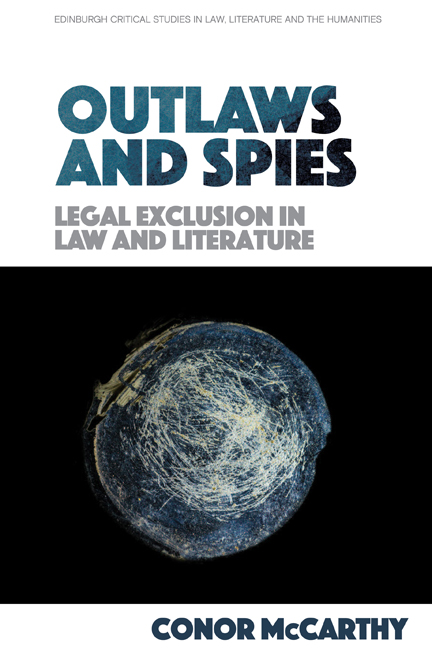Book contents
- Frontmatter
- Contents
- Acknowledgements
- Introduction
- 1 Outside the Law in the Middle Ages
- 2 Sovereign Outlaws: Shakespeare’s Second Tetralogy
- 3 The Endurance of Exclusion: Versions of Ned Kelly
- 4 ‘We’re Not Policemen’: Espionage and Law in John le Carré
- 5 ‘All Plots Tend to Move Deathward’: Plots and Consequences in Don DeLillo
- 6 Unanswered Questions: Ciaran Carson
- 7 Contesting the Virtual: William Gibson
- Conclusion
- Bibliography
- Index
Introduction
Published online by Cambridge University Press: 08 October 2020
- Frontmatter
- Contents
- Acknowledgements
- Introduction
- 1 Outside the Law in the Middle Ages
- 2 Sovereign Outlaws: Shakespeare’s Second Tetralogy
- 3 The Endurance of Exclusion: Versions of Ned Kelly
- 4 ‘We’re Not Policemen’: Espionage and Law in John le Carré
- 5 ‘All Plots Tend to Move Deathward’: Plots and Consequences in Don DeLillo
- 6 Unanswered Questions: Ciaran Carson
- 7 Contesting the Virtual: William Gibson
- Conclusion
- Bibliography
- Index
Summary
Article six of the Universal Declaration of Human Rights declares that ‘everyone has the right to recognition everywhere as a person before the law’. Implicit here is the idea that the law offers protection; article six states that availing of such protection is an automatic condition of being human. The Universal Declaration dates from 1948, and does not in itself have legal force; the right to recognition as a person before the law is a right that has often been ignored in the years before and since. This book is about the practice that article six seeks to abolish: exclusion from law. It discusses some of the ways in which individual persons, groups, places, states and nations have been considered to exist outside the law, and offers readings of a range of literary texts in English, from the Middle Ages to the present day, that represent such exclusion.
In the English legal system, from early medieval times until relatively recently, a person could be placed outside the law, deprived of the law's protection, through a legal process that declared them an outlaw. An outlawed person became a fugitive, and the word outlaw had the related senses of a person banished, or proscribed, or in exile, or of a person who lived without regard for the law, a person on the run. There is a sense of the outlaw being bestial in being compared to the wolf: the outlaw ‘bear(s) the wolf's head’. Outlawry bears some similarity to the related concepts of exile and banishment, both long-standing legal punishments. Its ecclesiastical equivalent is excommunication.
Legally, outlawry is now an historical phenomenon. In English law, outlawry was abolished for civil proceedings in 1879, and for criminal proceedings in 1938. But it was not entirely moribund in the centuries before its abolition. As we shall see, outlawry in its strict legal sense was still in use against bushrangers in nineteenth-century Australia, where the New South Wales Felons Apprehension Acts of 1865–99 and related legislation in Victoria and Queensland allowed outlawed persons who were armed (or believed to be armed) to be apprehended alive or dead by any person. The formal abolition of outlawry notwithstanding, the discussion below will argue that the practice of placing individuals outside the law is very much an enduring tactic of state power.
- Type
- Chapter
- Information
- Outlaws and SpiesLegal Exclusion in Law and Literature, pp. 1 - 20Publisher: Edinburgh University PressPrint publication year: 2020



